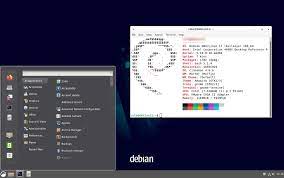Discover the Most User-Friendly Linux Distribution: Ubuntu’s Accessibility and Ease of Use
The Most Friendly Linux Distro
When it comes to choosing a Linux distribution, one of the key factors that many users consider is how user-friendly it is. While Linux has a reputation for being more technical and less user-friendly compared to other operating systems, there are distributions that strive to make the Linux experience accessible to all users, regardless of their level of expertise.
Among the various Linux distributions available, one that often stands out for its friendliness is Ubuntu. Ubuntu has gained popularity for its ease of use, intuitive interface, and extensive community support. Whether you are a beginner looking to make the switch to Linux or an experienced user seeking a reliable and straightforward operating system, Ubuntu offers a welcoming environment that caters to users of all levels.
One of the reasons behind Ubuntu’s user-friendliness is its focus on providing a polished and consistent user experience. The desktop environment in Ubuntu is designed to be visually appealing and easy to navigate, making it simple for users to find what they need without getting overwhelmed by complex settings or configurations.
In addition to its user-friendly interface, Ubuntu also benefits from a vast repository of software applications that can be easily installed using the built-in package manager. This makes it convenient for users to discover and install new software without having to deal with dependencies or compatibility issues.
Moreover, Ubuntu’s strong community support ensures that users have access to helpful resources, forums, and documentation that can assist them in troubleshooting issues or learning more about the operating system. Whether you have a technical question or simply want to connect with other Ubuntu enthusiasts, the community is always there to lend a hand.
Overall, Ubuntu’s commitment to providing a friendly and accessible Linux distribution makes it an excellent choice for users who value simplicity, reliability, and community engagement. By choosing Ubuntu as your operating system, you can enjoy a smooth and enjoyable computing experience while being part of a vibrant community that shares your passion for open-source technology.
Exploring the Most User-Friendly Linux Distributions: Answers to Common Questions
- What is the most user-friendly Linux distro?
- What is the smoothest Linux distro?
- What’s the most beginner friendly Linux distro?
- What is the perfect Linux distro?
- What is the most beginner friendly Linux distro?
- What is the most well maintained Linux distro?
- Which Linux distro does NASA use?
What is the most user-friendly Linux distro?
When it comes to the frequently asked question of the most user-friendly Linux distribution, Ubuntu often emerges as a popular choice among users seeking an accessible and intuitive operating system. Renowned for its user-friendly interface, extensive software repository, and robust community support, Ubuntu has established itself as a go-to option for both beginners and experienced users alike. Its emphasis on providing a polished and consistent user experience, coupled with a wealth of resources for troubleshooting and learning, makes Ubuntu a standout choice for those prioritising ease of use and community engagement in their Linux journey.
What is the smoothest Linux distro?
When it comes to identifying the smoothest Linux distribution, Ubuntu often emerges as a popular choice among users seeking a seamless and user-friendly experience. Renowned for its polished interface, intuitive design, and extensive community support, Ubuntu stands out for its commitment to providing a smooth and hassle-free computing environment. With a focus on simplicity and accessibility, Ubuntu offers a desktop environment that is visually appealing and easy to navigate, making tasks such as software installation and system configuration straightforward for users of all levels of expertise. Additionally, Ubuntu’s comprehensive repository of software applications and strong community presence contribute to its reputation as one of the smoothest Linux distributions available, catering to the needs of both beginners and experienced users alike.
What’s the most beginner friendly Linux distro?
When it comes to identifying the most beginner-friendly Linux distribution, Ubuntu often emerges as a popular choice among users seeking a smooth transition into the world of open-source operating systems. Renowned for its user-friendly interface, intuitive design, and extensive community support, Ubuntu caters to users of all levels of expertise. Its polished desktop environment and straightforward navigation make it easy for beginners to acclimate to Linux without feeling overwhelmed by technical complexities. With a vast repository of software applications readily available through its package manager and a helpful community always ready to offer guidance and assistance, Ubuntu stands out as a welcoming entry point for those looking to embrace the power and versatility of Linux while enjoying a supportive environment for their learning journey.
What is the perfect Linux distro?
The question of what constitutes the perfect Linux distribution is a common query among users exploring the vast landscape of open-source operating systems. While there is no one-size-fits-all answer to this question, as the concept of perfection can vary greatly depending on individual preferences and requirements, certain distributions are often praised for their user-friendly interfaces, robust features, and strong community support. Ultimately, the perfect Linux distro is one that aligns with your specific needs and priorities, whether you value ease of use, customizability, stability, or a particular software ecosystem. Exploring different distributions and finding one that resonates with your computing style and goals is key to discovering the ideal Linux experience for you.
What is the most beginner friendly Linux distro?
When it comes to finding the most beginner-friendly Linux distribution, Ubuntu often emerges as a popular choice among users seeking a smooth transition into the world of open-source operating systems. Known for its intuitive interface, extensive software repository, and robust community support, Ubuntu offers a welcoming environment for users new to Linux. Its user-friendly design and accessibility make it an ideal option for beginners looking to explore the benefits of Linux without feeling overwhelmed by technical complexities. With Ubuntu, beginners can easily navigate the system, install applications seamlessly, and tap into a wealth of resources to enhance their learning experience.
What is the most well maintained Linux distro?
When it comes to the question of which Linux distribution is the most well-maintained, one name that often stands out is Debian. Known for its stability, reliability, and commitment to open-source principles, Debian has a reputation for being meticulously maintained by a dedicated team of developers and volunteers. With a rigorous testing process and regular updates to ensure system security and performance, Debian has earned the trust of users who value a solid foundation for their computing needs. The meticulous attention to detail and the strong focus on quality assurance make Debian a top choice for those seeking a Linux distribution that is well-maintained and continuously evolving to meet the needs of its users.
Which Linux distro does NASA use?
NASA primarily uses the Debian Linux distribution for its space missions and scientific research projects. Debian’s stability, security features, and extensive package repository make it a reliable choice for NASA’s critical systems and applications. By opting for Debian, NASA benefits from a well-established open-source platform that aligns with their requirements for robustness and performance in the demanding environments of space exploration and scientific endeavours.




